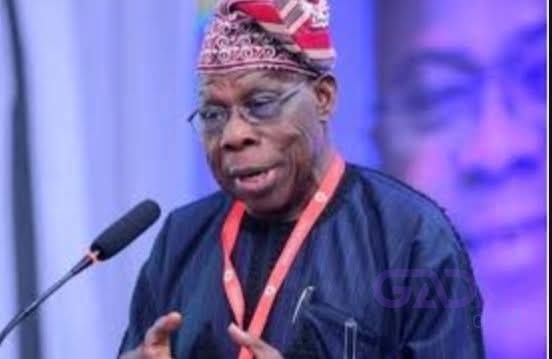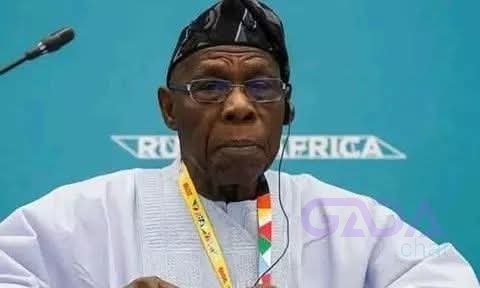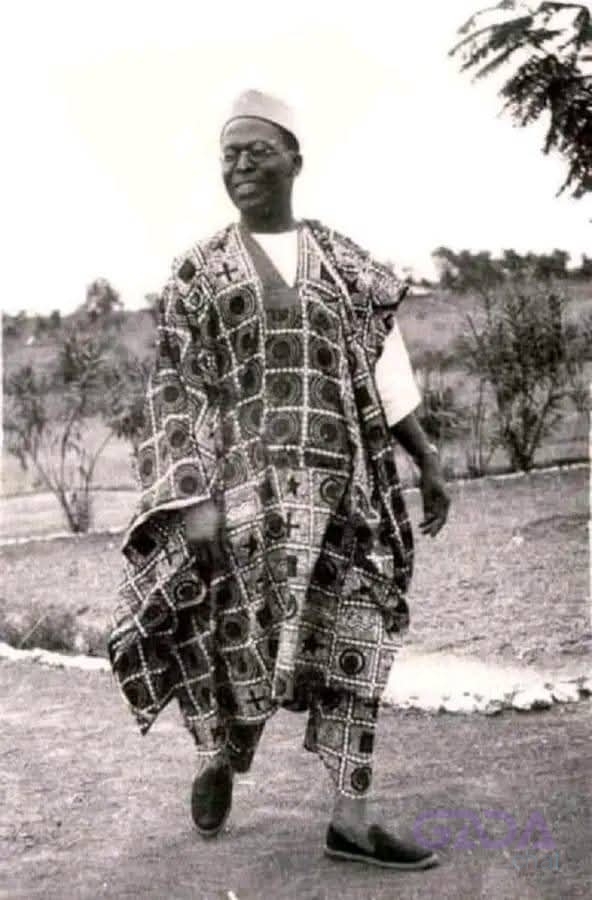'Let's Give Igbo A Chance'— Obasanjo’s Shocking Massage Over Nigerian Presidency
In the quiet of his Abeokuta residence, former President Olusegun Obasanjo sat with a delegation of southern leaders from the New Nigeria Peoples Party (NNPP), their voices mingling with the weight of a nation’s struggles. The air was heavy with purpose as Obasanjo, a elder statesman whose words still carry the resonance of decades in Nigeria’s political arena, delivered a sobering diagnosis: Nigeria, under President Bola Tinubu, remains a nation in bondage, shackled by insecurity, economic turmoil, and the divisive grip of ethnic-based politics.
His voice, steady yet laced with urgency, painted a vivid picture of a country adrift. “We have had Fulani Nigerian presidents, Hausa Nigerian presidents, Yoruba Nigerian presidents,” Obasanjo said, pausing for emphasis, “but we have not yet experienced a genuine Nigerian president—one who represents everyone, not just their ethnic group.” The room fell silent, the gravity of his words settling over the visitors, who had come seeking counsel ahead of the 2027 general elections.
Obasanjo’s message was clear: Nigeria’s challenges—banditry ravaging communities, an economy teetering on the edge, and tribalism fueling division—persist because its leaders have too often prioritized personal gain over national unity. “Our problems will persist until we take action,” he warned, his tone a blend of frustration and resolve. He spoke of a nation not only failing its own people but also falling short of the world’s expectations, its potential stifled by a cycle of ineffective leadership.
The former president’s call to action was both a plea and a challenge. He urged Nigerians to remain vigilant, to stay engaged in the political process, and to hold fast to hope despite the hardships. “We cannot advance if we continue to cycle leadership based on ethnic divisions,” he said, his words cutting through the room like a clarion call. Nigeria, he insisted, needs a leader who transcends tribal loyalties, one who embodies the collective aspirations of its diverse people.
As the NNPP leaders listened, Obasanjo’s vision for a united Nigeria unfolded. He spoke of immediate measures to tackle insecurity and revitalize the economy, warning that without such steps, the nation would remain trapped in a pattern of stagnation. “The majority of political leaders today are not genuine nationalists,” he declared, accusing them of chasing power for personal gain rather than the nation’s welfare.
The meeting in Abeokuta was more than a political consultation; it was a moment of reckoning. Obasanjo’s words, delivered with the conviction of a man who has seen Nigeria through its triumphs and trials, left no doubt: the country stands at a crossroads. As the rain-soaked streets outside his home buzzed with the rhythm of daily life, his message lingered—a call for a collective spirit, genuine intentions, and a leader who can finally unshackle Nigeria from its burdens and lead it toward a future worthy of its promise.
Follow Kenneth for Getting More Updates!
In the quiet of his Abeokuta residence, former President Olusegun Obasanjo sat with a delegation of southern leaders from the New Nigeria Peoples Party (NNPP), their voices mingling with the weight of a nation’s struggles. The air was heavy with purpose as Obasanjo, a elder statesman whose words still carry the resonance of decades in Nigeria’s political arena, delivered a sobering diagnosis: Nigeria, under President Bola Tinubu, remains a nation in bondage, shackled by insecurity, economic turmoil, and the divisive grip of ethnic-based politics.
His voice, steady yet laced with urgency, painted a vivid picture of a country adrift. “We have had Fulani Nigerian presidents, Hausa Nigerian presidents, Yoruba Nigerian presidents,” Obasanjo said, pausing for emphasis, “but we have not yet experienced a genuine Nigerian president—one who represents everyone, not just their ethnic group.” The room fell silent, the gravity of his words settling over the visitors, who had come seeking counsel ahead of the 2027 general elections.
Obasanjo’s message was clear: Nigeria’s challenges—banditry ravaging communities, an economy teetering on the edge, and tribalism fueling division—persist because its leaders have too often prioritized personal gain over national unity. “Our problems will persist until we take action,” he warned, his tone a blend of frustration and resolve. He spoke of a nation not only failing its own people but also falling short of the world’s expectations, its potential stifled by a cycle of ineffective leadership.
The former president’s call to action was both a plea and a challenge. He urged Nigerians to remain vigilant, to stay engaged in the political process, and to hold fast to hope despite the hardships. “We cannot advance if we continue to cycle leadership based on ethnic divisions,” he said, his words cutting through the room like a clarion call. Nigeria, he insisted, needs a leader who transcends tribal loyalties, one who embodies the collective aspirations of its diverse people.
As the NNPP leaders listened, Obasanjo’s vision for a united Nigeria unfolded. He spoke of immediate measures to tackle insecurity and revitalize the economy, warning that without such steps, the nation would remain trapped in a pattern of stagnation. “The majority of political leaders today are not genuine nationalists,” he declared, accusing them of chasing power for personal gain rather than the nation’s welfare.
The meeting in Abeokuta was more than a political consultation; it was a moment of reckoning. Obasanjo’s words, delivered with the conviction of a man who has seen Nigeria through its triumphs and trials, left no doubt: the country stands at a crossroads. As the rain-soaked streets outside his home buzzed with the rhythm of daily life, his message lingered—a call for a collective spirit, genuine intentions, and a leader who can finally unshackle Nigeria from its burdens and lead it toward a future worthy of its promise.
Follow Kenneth for Getting More Updates!
'Let's Give Igbo A Chance'— Obasanjo’s Shocking Massage Over Nigerian Presidency
In the quiet of his Abeokuta residence, former President Olusegun Obasanjo sat with a delegation of southern leaders from the New Nigeria Peoples Party (NNPP), their voices mingling with the weight of a nation’s struggles. The air was heavy with purpose as Obasanjo, a elder statesman whose words still carry the resonance of decades in Nigeria’s political arena, delivered a sobering diagnosis: Nigeria, under President Bola Tinubu, remains a nation in bondage, shackled by insecurity, economic turmoil, and the divisive grip of ethnic-based politics.
His voice, steady yet laced with urgency, painted a vivid picture of a country adrift. “We have had Fulani Nigerian presidents, Hausa Nigerian presidents, Yoruba Nigerian presidents,” Obasanjo said, pausing for emphasis, “but we have not yet experienced a genuine Nigerian president—one who represents everyone, not just their ethnic group.” The room fell silent, the gravity of his words settling over the visitors, who had come seeking counsel ahead of the 2027 general elections.
Obasanjo’s message was clear: Nigeria’s challenges—banditry ravaging communities, an economy teetering on the edge, and tribalism fueling division—persist because its leaders have too often prioritized personal gain over national unity. “Our problems will persist until we take action,” he warned, his tone a blend of frustration and resolve. He spoke of a nation not only failing its own people but also falling short of the world’s expectations, its potential stifled by a cycle of ineffective leadership.
The former president’s call to action was both a plea and a challenge. He urged Nigerians to remain vigilant, to stay engaged in the political process, and to hold fast to hope despite the hardships. “We cannot advance if we continue to cycle leadership based on ethnic divisions,” he said, his words cutting through the room like a clarion call. Nigeria, he insisted, needs a leader who transcends tribal loyalties, one who embodies the collective aspirations of its diverse people.
As the NNPP leaders listened, Obasanjo’s vision for a united Nigeria unfolded. He spoke of immediate measures to tackle insecurity and revitalize the economy, warning that without such steps, the nation would remain trapped in a pattern of stagnation. “The majority of political leaders today are not genuine nationalists,” he declared, accusing them of chasing power for personal gain rather than the nation’s welfare.
The meeting in Abeokuta was more than a political consultation; it was a moment of reckoning. Obasanjo’s words, delivered with the conviction of a man who has seen Nigeria through its triumphs and trials, left no doubt: the country stands at a crossroads. As the rain-soaked streets outside his home buzzed with the rhythm of daily life, his message lingered—a call for a collective spirit, genuine intentions, and a leader who can finally unshackle Nigeria from its burdens and lead it toward a future worthy of its promise.
Follow Kenneth for Getting More Updates!
0 Commenti
0 condivisioni
84 Views
0 Anteprima











